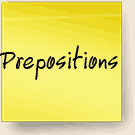
Josef Essberger
Prepositions can be divided into:
?one-word prepositions (eg at, into, on)
?complex prepositions (eg according to, in spite of)
The name "preposition" (pre + position) means "place before". Prepositions usually come *before* another word, usually a noun or noun phrase:
?noun (I will meet you IN *London*.)
?pronoun (Give it TO *her*.)
?noun phrase (I'm tired OF *all this work*.)
?gerund (verb in -ing form) (It crashed ON *landing*.)
If a preposition does not come before another word, it is still closely associated with another word:
?*Who* did you talk TO?
?TO *whom* did you talk?
?I talked TO *Jane*.
Notice that many prepositions can also be adverbs:
?He walked DOWN the hill. (preposition)
?Please sit DOWN. (adverb)
A few prepositions can also be conjunctions:
?Everyone came BUT Tara. (preposition)
?I asked her BUT she didn't answer. (conjunction)
--------------------------------------------------------------------------------
How many prepositions are there in English? It is not possible to give a definite answer, partly because complex prepositions are "open class", which means that new ones could be invented at any time. But for a list of almost all the one-word and complex prepositions in common use, see English Prepositions Listed which includes 370 example sentences.
--------------------------------------------------------------------------------
Many words are associated with a particular preposition. When you learn a new word, try to learn the preposition associated with it. A good dictionary usually gives you examples.
Here are some common verbs that are associated with a particular preposition:
?to agree WITH somebody
?to agree ABOUT a subject
?to agree ON a decision
?to agree TO a proposal
?to arrive AT/IN a place
?to ask FOR something (but to ask a question/the time/directions etc)
?to borrow something FROM somebody
?to depend ON somebody/something
?to explain something TO somebody
?to insist ON -ing
?to laugh AT somebody/something
?to listen TO somebody/something
?to participate IN something
?to pay FOR something
?to be rude TO somebody
?to shoot AT somebody/something
?to smile AT somebody
?to succeed IN something
?to talk TO somebody
?to talk WITH somebody (US)
?to worry ABOUT something
?to write TO somebody
Here are a few common expressions with particular prepositions:
?to be afraid OF somebody/something
?to be angry WITH somebody
?to be angry ABOUT something
?to be bad AT something
?to be clever AT something
?to be good AT something
?to be interested IN something
?to be kind TO somebody
?to be nice TO somebody
© 2001 Josef Essberger
Source: http://www.englishclub.com
